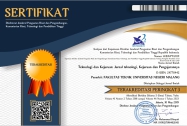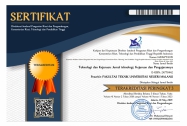Vocational High School Building Village Program as Link and Match for Community Economic Development
Abstract
Keywords
Full Text:
PDFReferences
Adhikary, P.K. (2005). Educational Reform for Linking Skills Development with Employment In Nepal. In M SINGH (Eds), Meeting Basic Learning Needs in the Informal Sector Integrating Education and Training for Decent Work, Empowerment and Citizenship. Hamburg, Germany: UNESCO Institute for Education.
Amalia, Y. (2021). Murid Pendidikan Vokasi Jenjang SMK Perlu Dibekali Keahlian Alternatif. Retreived from https://www.merdeka.com/peristiwa/murid-pendidikan-vokasi-jenjang-smk-perlu-dibekali-keahlian-alternatif.html
Deitmer, L. & Heinemann, L. (2009). TVET and R&D Evaluation: The Potential for Optimizing TVET. In R. Maclean, D. Wilson, & C. Chinien (Eds.), International handbook of education for the changing world of work, bridging academic and vocational learning (pp. 1521-1534). Bon: Springer.
Disas, E. P. (2018). Link and Match Sebagai Kebijakan Pendidikan Kejuruan. Jurnal Penelitian Pendidikan, 18(2), 231-242. Doi: 10.17509/jpp.v18i2.12965
Djojonegoro, W. (1999). Pengembangan Sumber Daya Manusia: Melalui Sekolah Menengah Kejuruan (SMK). Jakarta: PT Balai Pustaka.
Faberman, J., & Mazumder, B. (2012). Chicago Fed Letter. This article reviews the concept of skills mismatch in the labor market and examines its role in explaining ongoing low levels of hiring and high levels of unemployment during the current economic recovery.
Fatmawati., Hakim, L., & Mappiring. (2020). Pembangunan Desa Mandiri melalui Partisipasi Masyarakat di Kecamatan Pattalassang Kabupaten Gowa. Journal of Public Policy and Management, 1(1). Retreived from https://journal.inismuh.ac.id_pdf
Heinz. W. R (2009). Redefining the Status of Occupations. In J. A. Athanasou, R. V. Esbroeck. International Handbook of Career Guidance. Springer Science Business Media B.V.
Indriaturrahmi., & Sudityano. (2016). Peran Dunia Usaha dan Industri dalam Penyelenggaraan SMK berbasis Kearifan Lokal Kota Mataram. Jurnal Pendidikan Vokasi, 6(2), 162-172. Retreived from https://journal.uny.ac.id/index.php/jpv/article/view/6277/ 8013
Judisseno, R. K. (2008). Jadilah Pribadi yang Kompeten di Tempat Kerja. Jakarta: PT Gramedia Pustaka Utama.
Kemdikbud. (2021). SMK Pusat Keunggulan Jadi Daya Dorong Penciptaan Lulusan Unggul dan Kompeten. Retreived from https://www.kemdikbud.go.id/main/blog/2021/03/smk-pusat-keunggulan-jadi-daya-dorong-penciptaan-lulusan-unggul-dan-kompeten)
Mahfud, T., & Ade, N. (2010). Peran SMK Sebagai Specific Human Capital Dalam Memembangun Ekonomi Indonesia. Retreived from http://mahfudz30.wordpress.com
Majid, A. (2012). Perencanaan Pembelajaran: Mengembangkan Standar Kompetensi Guru. Bandung: Alfabeta.
McGowan, M. A., & Andrews. (2015). Skill Mismatch and Public Policy in Oecd Countries. Economics Department Working Papers No. 1210. OECD Better Policies for Better Live. Paris, Cedex.
Putranto, I. (2017). Peengembangan Model Kerjasama Link and Match untuk meningkatkan Kesiapan Kerja Bagi Lulusan SMK Kompetensi Keahlian Akuntansi di Kota Semarang. Jurnal Mandiri: Ilmu Pengetahuan, Seni dan Teknologi, 1(1). Retreived from https://core.ac.uk/download/pdf
Sanjaya, W. (2009). Perencanaan dan Desain Sistem Pembelajaran. Jakarta: Kencana Prenada Media Grup.
Setyaningsih, T. (2016). Manajemen Sumber Daya Manusia dalam Implementasi Kurikulum Berbasis Kempetensi di SMK Negeri 9 Surakarta. Tesis. Tidak diterbitkan. Surakarta: Universitas Muhammadiyah Surakarta.
Solehudin, I. (2019). Pendidikan Vokasi Industri Dibuka, Kurikulum SMK Harus Menyesuaikan. Retreived from https://www.jawapos.com/nasional/pendidikan/06/03/2019/ pendidikan-vokasi-industri-dibuka-kurikulum-smk-harus-menyesuaikan/
Sudira, P. (2012). Filosofi dan Teori Pendidkan Vokasi dan Kejuruan. Yogyakarta: UNY Press.
Sudira, P. (2012). Pendidikan Kejuruan dan Vokasi Berbasis Tri Hita Karana. Kongres Pendidikan, Pengajaran & Kebudayaan 1 (Pusat Studi Pancasila UGM).
Suparno. (2008). Ketrampilan Dasar Menulis. Jakarta: Universitas Terbuka
Sutrisno, J. (2006). Penyelenggaraan Sekolah Menengah Kejuruan. Jakarta: Direktorat Pembinaan Sekolah Menengah Kejuruan.
Suyanto. (2008). Peran SMK Dalam Mendukung Partumbuhan Ekonomi Daerah. Jakarta: Direktorat Pembinaan Sekolah Menengah Kejuruan. Jakarta: Direktorat Jenderal Manajemen Pendidikan Dasar dan Menengah, Departemen Pendidikan Nasional.
Tilaar, H.A.R. (2008). Manajemen Pendidikan Nasional. Bandung: Remaja Rosdakarya
Tilaar, H.A.R., & Riant, N. (2008). Kebijakan Pendidikan. Yogyakarta: Pustaka Belajar
Totoh, A. (2021). Filosofi Pendidikan Kejuruan Vokasi. Retreived from https://www.kompas. com /edu/read/2020/09/17/143055171/kemendikbud-pendidikan-vokasi-percepat-lulusan-smk-peroleh-kerja
Usman, H., & Darmono. (2016). Pendidikan Kejuruan Masa Depan. Yogyakarta: Pusat Kurikulum dan Perbukuan Badan Penelitian dan Pengembangan Kementerian Pendidikan dan Kebudayaan.
Wagner, T. (2010). Overcoming The Global Achievement Gap (online). Cambridge, Mass: Harvard University
Wahyuni, N. C. (2021). Perkuat Vokasi Kemdikbud Ubah Signifikan Kurikulum SMK. retreived from https://www.beritasatu.com/nasional/728397/perkuat-vokasi-kemdikbud-ubah-signifikan-kurikulum-smk
Walters, D. (2004). The Relationship between Post secondary Education and Skill: Comparing with Credentialism with Human Capital Theory. The Journal of Higher Education, 90(2), 97-124. Retreived from https://eric.ed.gov/?id=EJ720719
Wibawa, B. (2017). Manajemen Pendidikan Teknologi Kejuruan dan Vokasi. Jakarta: Bumi Aksara.
Wiranto, R. (2019). Bagaimana Link and Match Diterapkan di Pendidikan, retreived from https://www.kompasiana.com/rihadwiranto8428/5dc657d3097f361bae252a83/bagaimana-link-and-match-diterapkan-di-pendidikan
Zuniarti, S., & Budi, T. (2013). Pengaruh Mativasi Belajar, Kinerja Intensitas Pembimbingan Prakerin terhadap Kesiapan Kerja siswa SMK Pariwisata DIY. Jurnal Pendidikan Vokasi, 3(3), 405-415.
DOI: http://dx.doi.org/10.17977/um031v45i12022p19-31
Refbacks
- There are currently no refbacks.
Copyright (c) 2023 Teknologi dan Kejuruan: Jurnal Teknologi, Kejuruan, dan Pengajarannya
Teknologi dan Kejuruan: Jurnal Teknologi, Kejuruan, dan Pengajarannya
E-ISSN 2477-0442 (online)
Contact
Faculty of Engineering, Universitas Negeri Malang (UM)
Jl. Semarang No 5 Malang 65145, Building H5, 1st Floor.
Homepage: http://journal2.um.ac.id/index.php/teknologi-kejuruan
Email: teknologikejuruan.ft@um.ac.id

This work is licensed under a Creative Commons Attribution 4.0 International License.



2.png)
1.png)
1.png)
1.png)
4.png)
1.png)
.png)

3.png)
1.png)
1.png)


